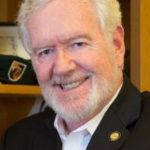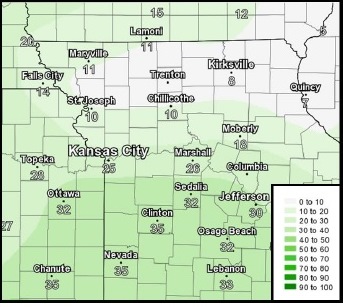
Guest column
Opinion
by Sen. Steve Fitzgerald, R-5th Dist.
The way forward
We are now past “turn around” when the House and the Senate exchanged bills. The rest of the session we will be working mostly on bills that originated in the other chamber, plus the budget and the tax bill – almost always the last things.
The bills that did not get worked by the originating house are pretty much dead. They could be amended into other bills or they might be resurrected in conference committee, where a lot of things happen that could not get through the committee process. There are other exceptions for bills that come through “exempt” committees such as tax, federal and state, and ways and means.
Bills such as SB 431, calling for the confiscation of weapons without due process, will never get a hearing. Such bills stir up a lot of controversy and it is difficult to know who is responsible for them. This bill came from the Senate Ways and Means Committee, it could have been introduced by a member of the committee or someone attending a committee meeting, The minutes of the committee were not yet available for the day it was introduced, Feb. 22. So there are no hints so far.
This brings up transparency. Bills do not have names on them and it is difficult to find out who is behind specific legislation. The practice of removing the contents of a bill and putting in entirely new contents, “gut and go” and the conference committee process are cited as reasons why legislators are reluctant to put their names on bills. A bill for clean fun could be gutted and the contents replaced with state supported pornography and still have the legislator’s name on it. Embarrassing and politically dangerous. A simple rule requiring the name of the requesting legislator be on every bill and allowing the removal of the legislator’s name if the bill is substantially changed could solve this problem.
I would appreciate your thoughts.
Quick facts
• Tax receipts for February totaled $373.1 million, $41.58 above February 2017 and collected nearly $27 million more in taxes than anticipated in February (Kansas Department of Revenue)
• Total tax receipts are $612.7 million above last year at this time (Kansas Department of Revenue)
• Individual income tax collections for the fiscal year are $268.97 million above expectations, totaling at $1.99 billion (Kansas Department of Revenue)
Since the fiscal year began in July, the state has collected $4.3 billion in taxes which is $275 million more than expected and a surplus of 6.8 percent (AP News)
Presentation on K-12 education funding
On Friday Feb. 23, Dr. Lori L. Taylor gave a preliminary presentation to a joint session of the Kansas Senate and House of Representatives on the methods, data, and analysis plan for her research on K-12 education funding in Kansas.
Dr. Taylor was hired by the Legislature in December to act as an expert witness and to investigate whether Kansas’ K-12 funding is adequate. This comes after the Kansas Supreme Court declared the current funding level is not enough and gave the legislature an April 30th deadline to create a new funding system. The school districts that are suing the state claim that $600 million more is needed to properly fund schools. The legislature hopes Dr. Taylor’s report will show that funding is adequate and help end years of school finance litigation between the courts and legislature.
Taylor, a native Kansan, holds a Bachelor of Arts in economics and a Bachelor of Science in business administration from the University of Kansas and received her doctorate degree in economics from the University of Rochester.
She is currently a professor at the Bush School of Government and Public Service at Texas A&M University and works as the director for Mosbacher Institute for Trade, Economics, and Public Policy. Taylor’s research is focused in school finance and she has consulted for numerous state legislatures and state and federal agencies on the topic.
During Friday’s presentation, Taylor outlined her study’s objective to estimate the level of spending required to produce a given outcome within a given educational environment. Taylor explained that she is looking at many different factors of school finance such as differences in spending, student outcomes, student needs, labor costs, geographical differences, and many other variables. One major variable Taylor will investigate in her research is student achievement relative to spending per pupil.
Taylor is expected to deliver her results to the Legislature by March 15, a few weeks before the court-mandated deadline.
Task force on substance use disorder
On Thursday, Gov. Jeff Colyer issued an executive order creating a task force addressing substance use disorder. The objective of the task force is to gather information regarding substance abuse in Kansas, particularly regarding the growing number of opioid and heroin overdoses in the state along with methamphetamine addiction. The task force will work to find useful resources and initiatives to fight drug abuse. It will also examine practices for prevention and treatment along with recovery options for at-risk individuals through early detection and education.
Since 2012, more than 1,500 Kansans have died from opioid or heroin overdoses and more than 100 Kansas residents continue to die each year. In 2016, drug poisoning was the cause of death to more than 300 people in Kansas, with 95 deaths caused by methamphetamine alone. The task force acknowledges that substance abuse is an illness which not only impacts the lives of those addicted but also their families and surrounding communities.
The task force will be chaired by Dr. Greg Lakin, chief medical officer at the Kansas Department of Health and Environment. Membership will be composed of heads from numerous state agencies, legislators, and professionals in industries such as education, law enforcement, hospitals, and more.
Aviation Day
The Kansas Department of Transportation Division of Aviation along with the Kansas Commission on Aerospace Education (KCAE) held its 4th annual Aviation Day event Thursday.
The day began with an economic development training event for city officials on how to best harness state and local resources to boost the aviation industry. During the Aviation Day event, legislators, manufacturers, suppliers, and aviation organizations gathered to discuss industry growth and opportunities and addressed development potentials for Kansas economic stakeholders.
The Kansas Commission on Aerospace Education highlighted industry development opportunities throughout the day, spreading awareness regarding STEM and aviation education through KCAE.
This week
Wednesday
Hearing on: HB 2486, allowing golf carts to be driven on certain streets at night – [Senate Transportation Committee, March 7 at 8:30 am]
Hearing on: SB 415, depositing all state sales tax revenues from sales on the Kansas state fairgrounds into the state fair capital improvements fund – [Senate Assessment and Taxation Committee, March 7, at 9:30 a.m.]
Hearing on: HB 2501, establishing the health occupations credentialing fee fund – [Senate Public Health and Welfare Committee, March 7, at 9:30 a.m.]
Hearing on: HB 2600, increasing the fees assessed by KDHE for certain radiation protection services – [Senate Public Health and Welfare Committee, March 7, at 9:30 a.m.]
Hearing on: HB 2458, adding violations of the act for obtaining a guardian or conservator, or both, to the crimes of mistreatment of a dependent adult and mistreatment of an elder person, changing the felony loss thresholds and adding the crimes to the inherently dangerous felony list – [Senate Judiciary Committee, March 7, at 10:30 a.m.]
Hearing on: HB 2479, allowing criminal cases to be stayed during state appeal of writ of habeas corpus relief – [Senate Judiciary Committee, March 7, at 10:30 a.m.]
Hearing on SB 378, creating the crime of counterfeiting currency – [Senate Judiciary Committee, March 7, at 10:30 a.m.]
Discussion on: Joint Senate Select Committee on Education Finance and House K-12 Education Budget Committee- Dr. Jesse Levin, Peer Review of the LPA and Augenblick Studies (Skype Presentation)
– [Senate Select Committee on Education Finance and House K-12 Education Budget Committee, March 7, at 1 p.m.]
Thursday
Hearing on: SB 367, sales taxation; treatment of coupons; certain cash rebates on sales or leases of new motor vehicles – [Senate Assessment and Taxation Committee, March 8 at 9:30 a.m.]
Presentation on: Concurrent Enrollment – KBOR, Dr. Blake Flanders, president and CEO – [Senate Education Committee, March 8 at 1:30 p.m.]
2018 Session Dates and Deadlines
Friday, March 23 Last day for non-exempt committee consideration
March 26-28 On floor all day
Thursday, March 29 On floor all day; Last day to consider non-exempt bills not in originating chamber
Friday, March 30 No Session
Friday, April 6 Drop dead day; first adjournment
Thursday, April 26 Veto Session begins
Thursday, May 4 Day 90
Sen. Steve Fitzgerald, Leavenworth, represents the 5th District, which includes part of western Wyandotte County.


